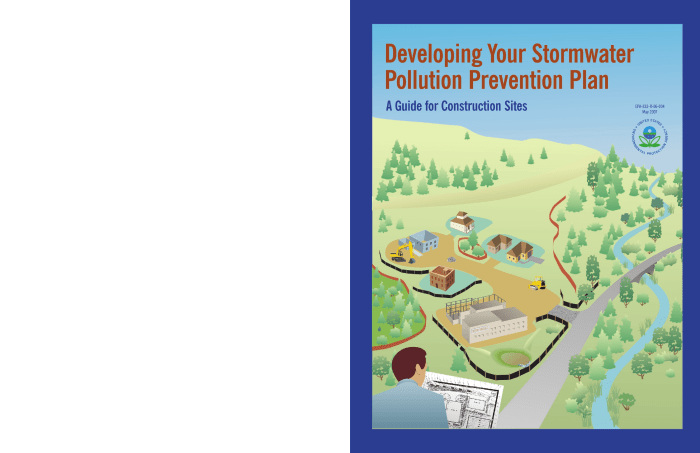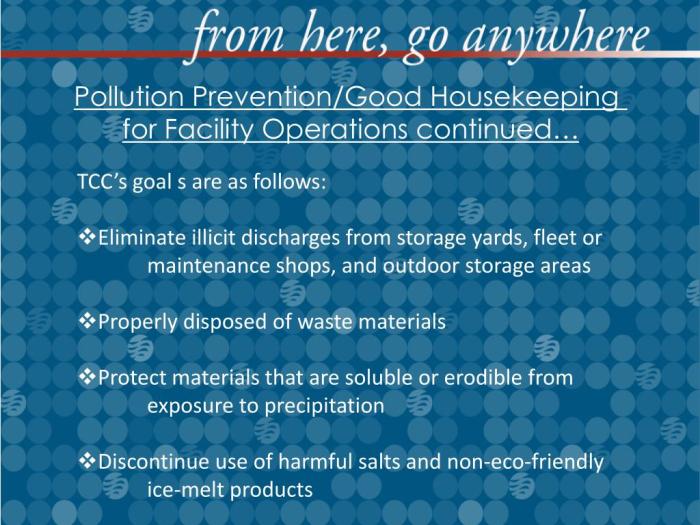Stormwater pollution prevention plan training – Stormwater pollution prevention plan (SWPPP) training is a critical component of safeguarding our water resources. This training empowers individuals with the knowledge and skills to develop and implement effective SWPPPs, minimizing the impact of stormwater runoff on our environment.
The prevalence of stormwater pollution and its detrimental effects on water quality underscore the urgent need for comprehensive SWPPP training. By equipping stakeholders with the necessary expertise, we can collectively combat this pressing environmental challenge.
Introduction

Stormwater pollution prevention plan (SWPPP) training is a critical component of effective stormwater management programs. SWPPP training provides participants with the knowledge and skills necessary to develop, implement, and maintain SWPPPs, which are essential for preventing water pollution from stormwater runoff.
Stormwater runoff is a major source of water pollution, carrying pollutants such as sediment, nutrients, bacteria, and toxic chemicals into our waterways. These pollutants can have a devastating impact on aquatic ecosystems, human health, and the economy.
Target Audience, Stormwater pollution prevention plan training
SWPPP training is intended for a wide range of audiences, including:
- Construction site managers
- Industrial facility operators
- Municipal stormwater managers
- Environmental consultants
The level of training required will vary depending on the roles and responsibilities of the participants.
Training Objectives
SWPPP training should have clear objectives that define the knowledge and skills participants should gain from the training. These objectives may include:
- Understanding the requirements of stormwater regulations
- Developing and implementing effective SWPPPs
- Selecting and installing appropriate best management practices (BMPs)
- Inspecting and maintaining BMPs
- Reporting and recordkeeping requirements
The effectiveness of the training should be evaluated based on the achievement of these objectives.
Training Content
SWPPP training should cover the essential elements of SWPPP development and implementation, including:
- Stormwater regulations and compliance requirements
- SWPPP development and implementation
- Best management practices (BMPs) for stormwater pollution prevention
- Inspection and maintenance of BMPs
- Reporting and recordkeeping requirements
The training content should be tailored to the specific needs of the target audience.
Training Methods
A variety of training methods can be used to engage the target audience and facilitate learning. These methods may include:
- Classroom lectures
- Hands-on demonstrations
- Case studies
- Role-playing exercises
- Online training modules
The most effective training programs will use a combination of these methods.
Training Materials
High-quality training materials are essential to support the training content. These materials may include:
- Training manuals
- Handouts
- Visual aids
- Online resources
The training materials should be developed by experts in the field of stormwater management.
Training Evaluation
A comprehensive training evaluation plan should be implemented to assess the effectiveness of the training. This plan may include methods such as:
- Participant feedback surveys
- Pre- and post-training assessments
- Observation of training sessions
The evaluation results should be used to improve the training program on an ongoing basis.
FAQ Summary: Stormwater Pollution Prevention Plan Training
What is the target audience for SWPPP training?
SWPPP training is designed for individuals responsible for developing, implementing, or maintaining stormwater pollution prevention plans, including construction site managers, industrial facility operators, and municipal stormwater managers.
What are the key components of SWPPP training?
SWPPP training typically covers topics such as stormwater regulations, SWPPP development and implementation, best management practices for stormwater pollution prevention, inspection and maintenance of BMPs, and reporting and recordkeeping requirements.
How can I evaluate the effectiveness of SWPPP training?
The effectiveness of SWPPP training can be evaluated through participant feedback surveys, pre- and post-training assessments, and observation of training sessions.

